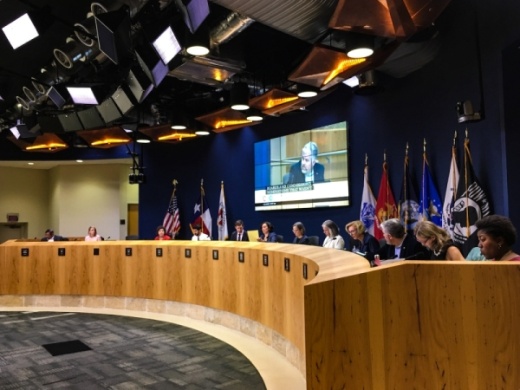Some City Council members, however, objected to the city spending up to $121,000 to hire Austin-based firm Scott Douglas & McConnico to argue that property owners have no formal protest rights during comprehensive revisions of the land development code.
City Council Members Leslie Pool, Kathie Tovo and Alison Alter voted against the city using taxpayer money to fight against what Pool said are taxpayer interests—the right to formally protest their property’s rezoning. Council Member Ann Kitchen abstained from the vote. Together, the council members were the four nays in the 7-4 vote to approve the first reading of land development code rewrite in December.
“My reason for voting against this is I don’t believe we should waste taxpayer dollars on outside attorneys to deny people the right to a valid protest,” Pool said to a handful of claps from the City Council Chambers audience Jan. 23.
State law provides the right of individual property owners to protest a zoning change to their or a neighbor’s property. If 20% of the landowners within 200 feet of the property in question protest the change, the change could only be approved with a three-fourths supermajority passage from City Council.
That law relates to zoning cases for individual properties; however, Austin’s legal experts have said the right to protest does not cover a wholesale rezoning of the entire city. As such, the city has refused to recognize with an official process the many protests relating to the rewrite. One of the lawyers representing the plaintiffs in the lawsuit said although many protests have come in, many more have not because of the city’s position that protests are not legitimate in this case.
The issue is but another chapter in the long saga that has been the city’s effort to rewrite its land development rules—a project that extends back to 2012. On Dec. 11, City Council took its first official vote on a rewrite proposal since the project began. Less than 24 hours later, on Dec. 12, a group of property owners, which includes Mary Ingle, Fred Lewis, Barbara McArthur, Pat King and James Valadez, filed a lawsuit against the city and City Council, arguing they had the right to protest.
Responding to Pool’s Jan. 23 comments, Council Member Jimmy Flannigan said the consensus on City Council is that protest rights do not exist for rezoning resulting from comprehensive land development code revisions, as determined by the city’s legal department. He said the issue is still an active debate and that City Council was not denying any rights since the legal determination is there are no such rights to deny.
The first court date for the lawsuit is set for Feb. 18.





